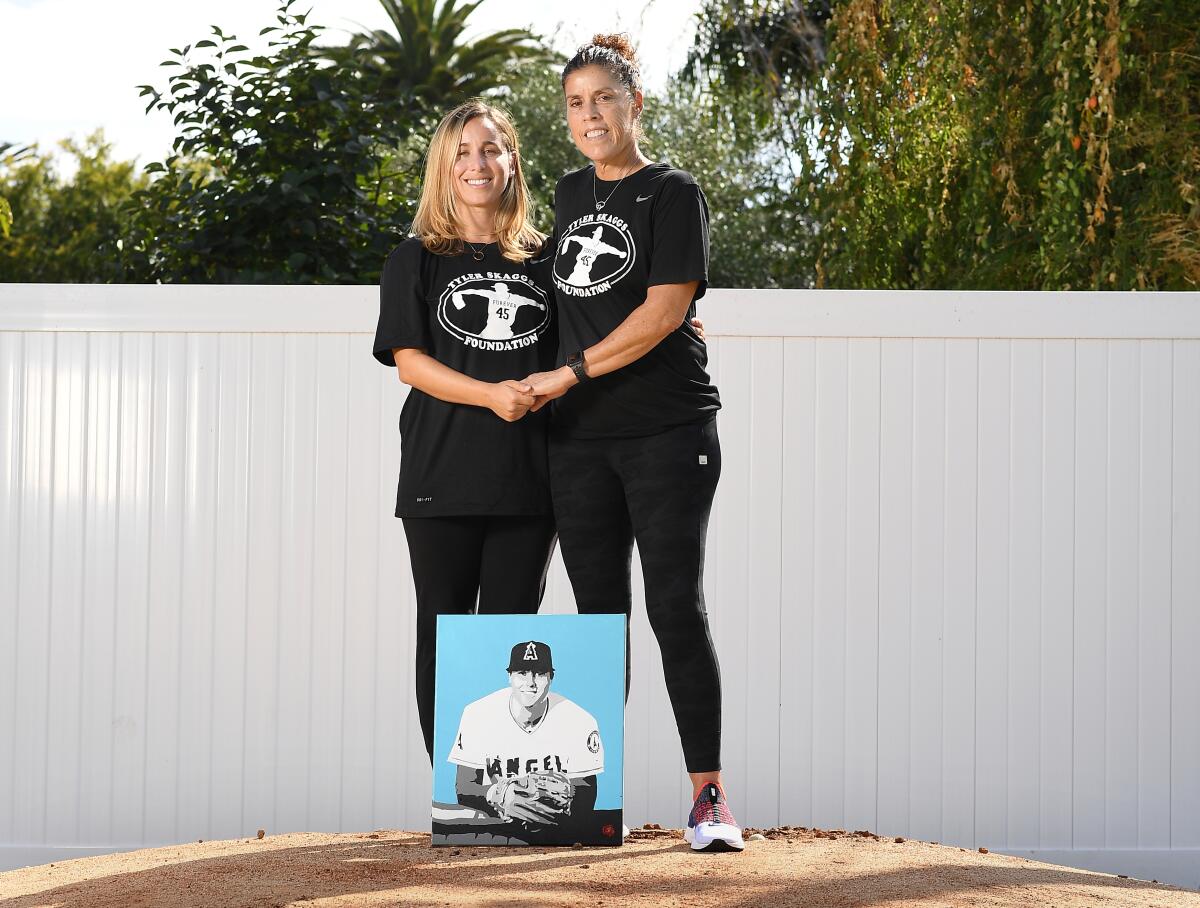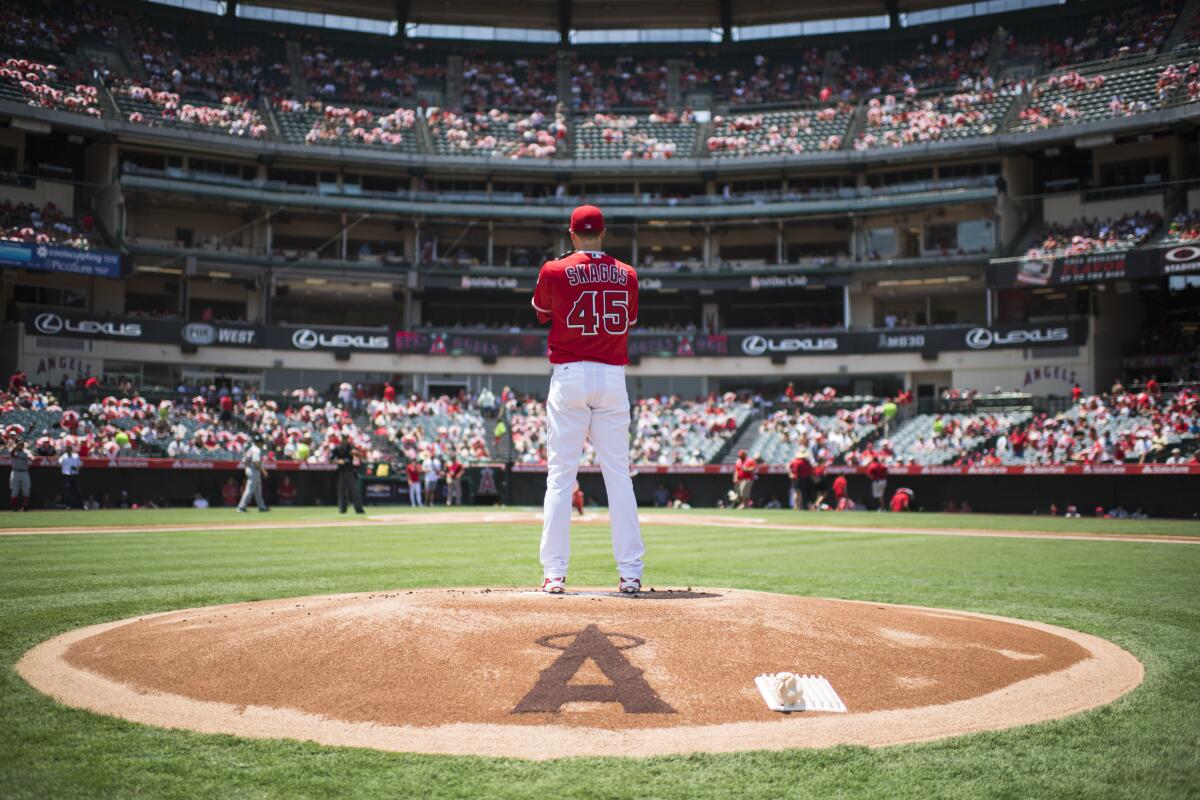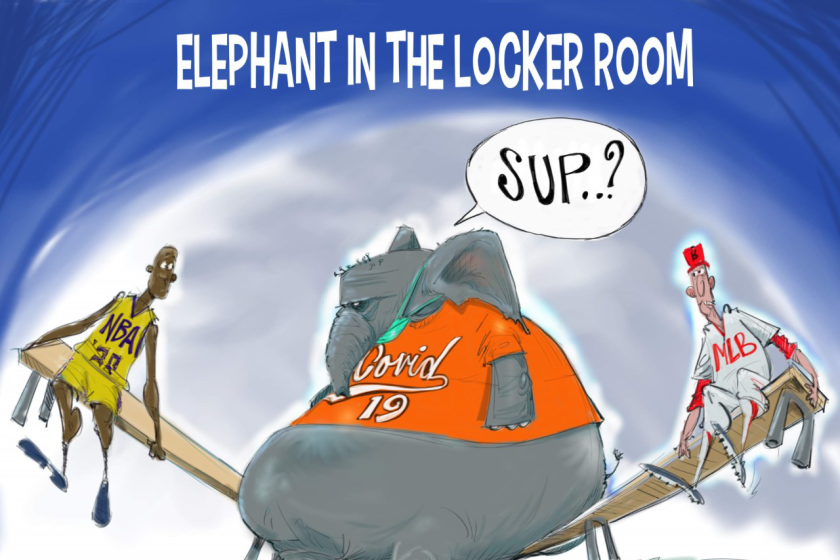Column: One year after his death, spirit of Angels pitcher Tyler Skaggs continues to inspire

- Share via
Carli Skaggs clings to him in her dreams.
“We’re driving along and I reach out to hold his hand like we always did … and his hand is there,” she says of her husband. “I can feel his grip. It’s so real.”
Debbie Hetman is comforted through the skies.
“I see him in butterflies,” she says of her son. “Every time I’m outside these days, there are butterflies. I even saw one in our garage, and I’m like, ‘That’s Ty, coming to visit us, always with us.’ ”
One year later after his death, Tyler Skaggs is still throwing strikes, hurling his strength deep into the hearts of the two women he loved most.
One year after a deadly drug overdose in a Texas hotel room, the generous spirit of the Angels pitcher surrounds and inspires his widow and mother as they seek answers, search for closure, and long for peace.
Carli wears Tyler’s wedding ring on a simple chain around her neck and gently holds it when times are tough.
“I’ll say, ‘I need you Tyler’… and there he is,” she says.
Andrew Toles, who last played for the Dodgers in 2018 and is on the restricted list, was arrested behind Key West (Fla.) Airport late Monday night.
Debbie wears the red bracelet that was distributed at his memorial service. It reads, “Tyler Skaggs, Forever In Our Hearts #45.”
“I’ll look down and see his name and it gives me peace,” she says. “I’m wearing this forever.”
Displayed in each woman’s residence is an identical black urn in the shape of a giant flame. Inside, resting in a place signifying the flickering embodiment of his soul, are Skaggs’ ashes.
“That flame, that’s just him,” Carli says.
As they approach the anniversary of Tyler’s death on July 1, 2019, Carli and Debbie have come together at Tyler’s childhood home in West Los Angeles to talk about keeping that flame alive.
Through streaking tears and with lip-biting toughness, they talk about how his spirit helped carry them through the early days after his death and has since inspired the work of the Tyler Skaggs Foundation at tylerskaggsfoundation.org.
All around them, the fireplace mantel and countertops are filled with Skaggs’ memorabilia. There are framed jerseys, childhood photos, a fan’s portrait, scuffed souvenir baseballs, Mike Trout’s batting gloves, even a Texas Rangers cap decorated with his number and worn by friend Scott Heineman in his major league debut a month after Skaggs’ death.
The items reveal how Skaggs’ seven-year career was marked by deep connections to fans and teammates, a man known as much for the strength of his friendship as the depth of his curve.
“We want to honor the way Ty lived,” Debbie says.
Left largely unspoken, for legal reasons, is their anguish over how he died.

According to the toxicology report, Skaggs, 27, died from a mixture of, “alcohol, fentanyl and oxycodone intoxication with terminal aspiration of gastric contents,” which means he choked on his vomit while intoxicated.
The Skaggs family said they were stunned by the mention of drugs.
Says Carli: “He didn’t exhibit any behaviors of someone who was abusing or addicted to drugs.”
Adds Debbie: “We saw him on a daily basis. I didn’t see any signs of any of that.”
What happened next made the story sadder.
ESPN reported that as part of a federal investigation in the pitcher’s death, former Angels media relations director Eric Kay told federal agents that he supplied Skaggs with opioids and that he abused drugs with the pitcher for years. Kay also reportedly told agents that two Angels employees — former communications vice president Tim Mead and traveling secretary Tom Taylor — knew of Skaggs’ drug use before his death.
Mead and Taylor denied Kay’s claims, and the Angels initially issued a statement saying, “We have never heard that any employee was providing illegal narcotics to any player, or that any player was seeking illegal narcotics.”
The federal investigations are ongoing, and Skaggs’ family refers all related questions to their attorney, Rusty Hardin, who notes that the statute of limitations on a wrongful-death lawsuit in Texas and California is two years.
”The family is waiting to see what the investigations develop,” Hardin says. “We have been contacted by people investigating opioids in baseball in general, and separately as it applies to the death of Tyler.”
He adds, “The family is most driven by wanting to know what caused Tyler’s death, and is it part of a bigger problem in baseball, and are others responsible for what happened.”
The family’s limbo adds to their pain.
“We still want answers … of course, in order to have closure we need to get all the answers,” Debbie says.
In the meantime, they want people to celebrate the generosity with which Tyler lived. It is no coincidence that perhaps his last public act of kindness occurred in his last start, two days before his death. It wasn’t about the loss he took against the Oakland Athletics, but for what happened afterward.
Skaggs not only left tickets for a fan who was an aspiring player, he brought the young man to the family room at the stadium afterward and gave him a pep talk.
“Afterward, I saw the boy crying and I asked his mom if he was OK, and she said, ‘Yeah, Tyler’s words just really touched him,” Carli says.
This kind of emotional connection started at home. Carli and Tyler, who were married exactly eight months before his death, would constantly express their love for each other in text messages. They texted so much, they often debated over who loved each other more.
”Every other text message was, ‘I love you, I miss you, you’re my best friend, I can’t wait to see you,’” Carli remembers. “He’d leave for the field and 15 minutes later there would be a text on my phone saying, ‘I miss you babe.’”
On days he pitched, if he couldn’t find her in the stands, he would text her from the dugout before he took the mound, writing, “Where are you babe, are you here?”
He was also regularly texting Debbie, a former Santa Monica High softball coach who helped teach him to pitch on a mound that is still in the backyard.
“I would text him things about pitching: How are you feeling, how’s your leg, how’s your arm?’” she recalls. “On Sunday after his last start, he texted back, ‘Everything is good mom.’”
A day later, on the morning of July 1, with the Angels ensconced in their Southlake, Texas, hotel rooms preparing to begin a series against the Rangers, the texting stopped. Carli, who heard from him every morning, got nothing. Debbie, who heard from him every day, got nothing.
“We keep calling each other trying to figure out what was going on,” Debbie says. “We both knew something was wrong.”
As Carli was pulling up to the curb in front of her parents’ Santa Monica home, she received the call about his death from Angels general manager Billy Eppler. His words sent her screaming into the house.
“I’ll never, ever forget that call,” she says.
She immediately called Debbie, who handed the phone to her husband Dan and began pounding the couch.
“I was shouting, ‘It can’t be true, it can’t be true,’” she recalls. “I couldn’t believe it happened to my son. Not my son. Not my Ty.”
Amid the dazed swirl of sadness, Tyler’s spirit inspired each woman to specific acts of courage.
For Debbie, it was in throwing out the first pitch in the Angels’ first home game after Skaggs’ death, a dozen days after his passing, on a Friday night against the Seattle Mariners. Fighting through waves of emotion, she bravely took the mound, standing on the rubber instead of in front of the bump like most first-pitch participants, and aimed for the glove of Tyler’s close friend Andrew Heaney.

Faces not in your crowd: The billionaire owners who rule baseball
A team-by-team look at the billionaire MLB team owners who brought baseball to the brink during negotiations with players to launch a 2020 season.
“I was nervous and I was scared,” she remembers. “Andrew said, ‘Debbie, you’ve got to throw from the rubber. Tyler would be really disappointed if you didn’t.’ And I’m like, ‘I hope I don’t bounce it.’”
With her son’s memory pushing her, she not only didn’t bounce it, she threw a perfect strike, setting the stage for a mystical evening.
“I could feel Tyler’s spirit running through me,” she says. “I was drawing from his strength.”
What happened next was the stuff of legend, as Taylor Cole and Felix Pena threw a combined no-hitter in a 13-0 victory. Afterward, the Angels, all wearing Skaggs’ number 45, placed their jerseys on the mound to create a spontaneous memorial.
“It was surreal, so numbing,” Carli says. “Everywhere you looked, there was his giant photo and the words, ‘In Loving Memory.’ It was like, is this really happening?”
The numbers of that day were almost beyond belief. The Angels scored seven runs in the first inning and finished with 13. Skaggs’ birthday was 7/13. The previous combined no-hitter in California was on Skaggs’ actual birthday. It was the 11th no-hitter in Angels franchise history. Skaggs wore number 11 at Santa Monica High.
By the end of the night, watching in amazement from a suite, the Skaggs family fully understood.
Says Carli: “It was a magical game for a magical person. Tyler was definitely at the stadium.”
Says Debbie: “I don’t believe in coincidences. You have to believe Tyler was there.”
He appeared again to Carli again 10 days later, when Skaggs’ memorial service packed 900-seat St. Monica’s Catholic Church. She wasn’t scheduled to speak. But as the last scheduled speaker was talking, Carli decided to give a eulogy that described their love.
A year later, she acknowledges she leaned on Tyler to pull her to her feet.
“I was talking to Tyler in my head. I told him, ‘I need you to give me some strength right now,’” she says. “He did. He always did.”
Carli still communicates with several Angels players and staff. Debbie says the Angels reach out to her through her husband. Their connection is visible yet unsettled. Everyone is waiting for answers.
“I don’t know if awkward is the right word,” Debbie says. “It’s just …”

What is not awkward is the devotion of his former teammates. Shortstop Andrelton Simmons recently sent Carli a text letting her know how much Skaggs was still inspiring him to be a better person.
“The biggest thing was how loving he was towards the people around him and how he expressed that love in a cool way, which guys are too afraid to do,” wrote Simmons. “I’ve been trying to implement those things in my life and share love or speaking up whenever I feel it’s right without fear of what people might think.”
As the first anniversary of Skaggs’ death approaches, his wife and mother use that inspiration.
The house that Carli and Tyler bought several months before his death sits empty. Carli could never bring herself to move in. They were going to raise a family there. But she’s remodeling and visits it every day. Perhaps at some point she will rent it to tenants if they agree to one caveat.
“I want to be able to stop by now and then,” she says. “I like hanging out there. I still feel his presence there.”
Letters from readers to the Los Angeles Times sports department.
Debbie looks at the big couch in front of the giant TV set in her family‘s home and thinks about how Tyler used to plop down there with his dinner on a tray and ESPN on the tube. She cringes at the emptiness.
“He was just a giant presence,” she says. “Such a selfless, giving presence.”
The women hope that Skaggs’ fledgling foundation will mirror that presence.
They’ve handed out free lunches to Santa Monica children from low-income families, refurbished a batting cage at Tyler’s North Venice Little League, sponsored a travel team and supported two student-athletes on a missionary trip. Tyler loved children, so they are planning a toy drive for local hospitals.
“It hurts so bad that I’m not going to see Ty as a father,” Debbie says. “He would have been an amazing father.”

Carli and Debbie are steeling themselves for the next challenge, that of enduring the July 1 anniversary.
Carli is going to host a gathering at her residence, then remove a few ashes from his urn, carry them to the beach and spread them in the Pacific.
“It’s going to be hard, but he loved the ocean,” she says.
Debbie is planning on placing flowers at a mural of Tyler located across the street from Santa Monica High. In the painting by local artist Jonas Never, Skaggs is grinning and tossing a baseball. There is no ceaseless sadness, no unending questions, nothing but an ageless pitcher in an endless summer.
Debbie, who still teaches physical education at the school, often visits the mural to speak to her son. After recent protests rocked the area, she made a special trip there and was comforted by what she found.
“It was untouched,” she says, a mother forever proud of her son. “He’s still smiling. He’s still there.”

Faces not in your crowd: The billionaire owners who rule baseball
A team-by-team look at the billionaire MLB team owners who brought baseball to the brink during negotiations with players to launch a 2020 season.
More to Read
Go beyond the scoreboard
Get the latest on L.A.'s teams in the daily Sports Report newsletter.
You may occasionally receive promotional content from the Los Angeles Times.









